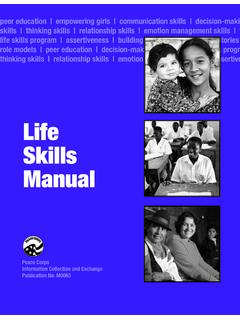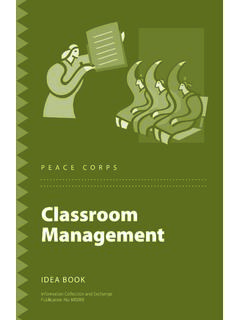Transcription of The Role of NGOs in a Civil Society - Peace Corps
1 An NGO Training Guide for Peace Corps Volunteers Module 1: The Role of NGOs in a Civil Society NGO GUIDE An NGO Training Guide for Peace Corps Volunteers Module 1: The Role of NGOs in a Civil Society page 15 MODULE 1 THE ROLE OF NGOS IN A Civil Society In this first module of An NGO Training Guide for Peace Corps Volunteers, you build on your experiences with nonprofit organizations in the United States to gain an understanding of the critical role nongovernmental organizations (NGOs) play in developing Civil societies. By the time you complete this module you should have acquired the knowledge, skills, and attitudes to: Describe four characteristics that differentiate NGOs from government organizations and for-profit businesses. Identify some major sectors ( , health, youth, or women s issues) where NGOs are active in your country of service.
2 Explain in your own words how each of the six key elements of public participation increases the involvement of citizens in a Civil Society . Select three words that describe the appropriate role of a Peace Corps Volunteer in working with NGOs, and give examples of situations where each role would be useful. A VOLUNTEER S STORY Peace Corps /Jamaica Volunteers work with a variety of NGOs and community-based organizations (CBOs). An environmental business Volunteer and her Counterpart realize that there are few better ways to inspire youths interest in the environment than by involving them in hands-on projects to improve their environment. They helped youth at the Jack s Hill Community Center organize an environmental club. The new club decided to plant ferns at Jackson Spring.
3 The Volunteer reports. The following Saturday, I arrived at Jackson Spring at 8:00 to find a group of six youth brushing the spring area and preparing it for planting. I was excited to see my Counterpart and the kids had taken so much interest in the environment and that our project was underway. Service projects involving groups of students allow young persons to learn to work together and develop leadership roles. In addition, they offer opportunities for students to analyze problems and propose and execute solutions. Through participation, youth prepare to take on citizens responsibilities in a Civil Society . When students are put in positions of responsibility, they are counted on to show up on time and ready to work and to see a project through to completion.
4 They An NGO Training Guide for Peace Corps Volunteers Module 1: The Role of NGOs in a Civil Society page 16 learn the consequences of letting down those they intended to help. These life skills are important for later success. * * * * * * * * * * WHAT IS YOUR EXPERIENCE WITH NONGOVERNMENTAL ORGANIZATIONS? Initially, you may think that your experience with NGOs has been minimal. However, consider such organizations as Big Brothers/Sisters, Boy/Girl Scouts, Goodwill, Salvation Army, YMCA, and your local church or place of worship and the extent to which they are involved in your daily life. In the United States these organizations are called nonprofits or not-for-profits; in the rest of the world they are more commonly known as nongovernmental organizations (NGOs).
5 They play an important role in most communities. As a Volunteer your service is likely to involve NGOs. A number of Volunteers report successful, satisfying experiences working with NGOs either in their primary assignment or through community outreach projects. Volunteers in all sectors (agriculture, business, education, environment, health, and youth) work with NGOs. In this module, you will begin to learn more about NGOs. You will have opportunities to: Review and reflect on your previous experiences with nonprofit organizations; Read about the important role that NGOs play in development; Engage in short activities to explore how NGOs operate in your country of service; and Discover why and how PCVs work with NGOs. Take a few moments to reflect on your experiences with nonprofit organizations.
6 Many of you have provided services and assistance, and/or given money to these organizations. You may have donated blood to the American Red Cross. During Halloween some may have participated in the Trick-or-Treat for UNICEF (United Nations International Children s Education Fund) program that raised funds for children around the world. Others may have helped the local parent-teacher association (PTA), fraternity or sorority, Rotary Club, or the Sierra Club. And still others may have been impacted by the powerful message of a nonprofit founded by an individual with a passionate message, such as Mothers Against Drunk Driving (MADD). Never doubt that a small group of committed citizens can change the world. Indeed, it is the only thing that ever has. Margaret Mead An NGO Training Guide for Peace Corps Volunteers Module 1: The Role of NGOs in a Civil Society page 17 ACTIVITY 1:1 COMMON CHARACTERISTICS OF NGOS In this activity, you begin the process of transferring your knowledge and understanding of nonprofits in your home country to the workings of NGOs in your country of service.
7 1. Choose a nonprofit organization you are familiar with and answer the following: What programs and services did the nonprofit offer? Who were their stakeholders? Individuals who cared about or benefited from the organization? Why was the organization founded? Who founded the organization? Who managed the organization: a board of directors, paid staff, volunteers? How was the organization financed: donations, special fundraising events, fees from beneficiaries, grants, or a combination of these? How did you become involved with the organization: contributor, volunteer, board member, beneficiary, or staff member? What difference would it make in the community if the nonprofit organization did not exist? 2. Share your answers about the nonprofit organization with others in your training group.
8 3. Can the group agree on common characteristics of nonprofit organizations? Note: You may wish to refer to the list of possible common characteristics of nonprofit organizations at the end of this module in Activity 1:1 Reference. An NGO Training Guide for Peace Corps Volunteers Module 1: The Role of NGOs in a Civil Society page 18 WHY THE Peace Corps PLACES VOLUNTEERS WITH NGOS The Peace Corps is a unique government development agency with a history of working with community partners and colleagues to build capacity one person at a time. From its beginnings, the Peace Corps philosophy has been that it is better to teach people to fish or raise their own fish than to give them fish to eat. This is what capacity building is about empowering people to help themselves. Today, Volunteers continue to build individual capacity and the capacity of organizations and communities.
9 Increasingly, NGOs are recognized as important players in the formulation, design, and application of development strategies. International development organizations are placing greater emphasis on working with national and local NGOs to emphasize local knowledge and participatory development The Peace Corps development philosophy is similar to the philosophy of many NGOs. Ideally, a Peace Corps project should: Increase local capacities; Target beneficiaries who are often among the needy; Seek sustainable solutions; and Involve beneficiaries in the development process. When the interests of the Peace Corps and an NGO overlap, working together helps both organizations achieve their goals. However, some NGOs missions do not coincide with those of the Peace Corps . For example, the Peace Corps does not place Volunteers with an NGO whose mission is to elect political candidates, or an NGO with countercultural values.
10 In many countries this is a very delicate balance. The Peace Corps strives to support Civil societies, and NGOs generally contribute to building Civil societies. Yet, in some countries NGOs question governmental authority and thus are seen as destabilizing influences. I know of no more encouraging fact than the unquestionable ability of man to elevate his life by conscious endeavor. Henry David Thoreau An NGO Training Guide for Peace Corps Volunteers Module 1: The Role of NGOs in a Civil Society page 19 CHARACTERISTICS THAT DISTINGUISH NGOS An organization may be correctly labeled an NGO if it has four characteristics identified by The Commonwealth Foundation, a London-based NGO study group. These characteristics are included here, with the permission of The Commonwealth Foundation, from its 1995 publication Non-Governmental Organizations: Guidelines for Good Policy and Practice.











